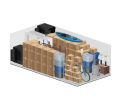Self-storage is an industry where businesses and individuals rent storage space, like rooms, lockers, or outdoor areas, for short-term or long-term needs, often on a month-to-month basis.
Here's a more detailed breakdown:
- What it is:
- Self-storage facilities offer rented storage units, which can range from small lockers to larger rooms or even outdoor spaces.
- Who uses it:
- Both businesses and individuals utilize self-storage for various purposes, including storing personal belongings, business inventory, or items that require temporary or long-term storage.
- How it works:
- Tenants rent a unit, typically on a month-to-month basis, and are responsible for accessing and storing their own items within the unit.
- Examples of uses:
- Personal: Storing furniture during a move, seasonal items, or items that are rarely used.
- Business: Storing inventory, archived documents, or equipment.
- Key features:
- Security: Storage facilities often have security measures like surveillance cameras, fencing, and alarms.
- Flexibility: Units can be rented for short or long periods, with options for different sizes and features like climate control.
- Convenience: Self-storage provides a convenient and secure way to store items that may not fit in a home or office.







